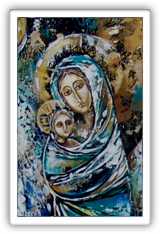|
|
Comprehending Medjugorje : Original Documents And Conversations with Arnaud Dumouch
The tree and its fruits
Reference (French Edition) :
Daria Klanac, Comprendre Medjugorje : Regard historique et théologique, avec la collaboration du théologien Arnaud Dumouch, Informativni centar Mir, Medjugorje, en coédition avec les Éditions Sakramento, Paris, 2012, 2e éd. (1re éd. 2008, ISBN 978-2-915380-19-4 & 978-9958-36017-6), entretien avec le théologien Arnaud Dumouch, pages 151 à 154.
English Translation by Duško Čondić
The tree and its fruits
Daria Klanac : Medjugorje—a “monumental fraud” for man, or “a time of great grace” for many, yields good fruit that no one denies.
Arnaud Dumouch : “Good fruits,” (conversions, etc.) are a good sign. However, they are insufficient to serve to conclude, inasmuch as the Holy Ghost is present wherever man truly seeks Christ.
D. Klanac : Meanwhile, in Medjugorje there is confusion regarding the “Tree.” Can a good tree simultaneously yield good and bad fruits?
A. Dumouch : Yes! Absolutely! In fact, that is always the case as witnessed by Jesus Himself (Mk 10:29-30), “Amen I say to you, there is no one who has left house, or brothers, or sisters, or mother, or father, or children, or lands, for my sake and for the gospel’s sake who shall not receive now in the present time a hundredfold as much, houses, and brothers, and sisters, and mothers, and children and lands—along with persecution and in the age to come life everlasting.”
One need to carefully contemplate the life of Jesus and His preaching: He imparts fruits of love and peace to the poor, but also a whole parcel of fruits of bewilderment, unrest, hate, and lies as seen by many theologians and faith authorities. This can be seen by this small image: “Did not Moses give you the Law? Yet, nonetheless, none of you observe the Law. Why do you seek to put me to death?” The crowd answered and said: “Thou hast a devil. Who seeks to put you to death?” (John 7:19-20).
But, take caution. Even these persecutions and the unrest are not proof of the verity of Medjugorje. They are indifferent as regards evaluation: all that is found on Earth is mixed with good and evil, wheat and chaff.
D. Klanac : As the obverse to that, can a bad tree yield good fruits?
A. Dumouch : It can for brief period of time, but not for long. Generally, a bad tree is quickly recognized by the fruits that appear. This applies and is true for the areas of human love as well as for the field of Christianity.
Here is an example of the human plan (I make use of this example, since by analogy, it will shed light on the Christian point of view): let us imagine a man who marries a woman—not because he loves her, but rather, for sake of her money: the tree that gives birth to his acts is bad (avarice after money). He will be able to endure for a few months—perhaps, even for a few years. However, it seems to me, that it is impossible that his lie will not surface sooner or later. Once he latches on to her money, he will no longer pretend love, since he does not love.
Now then, the Christian plan: let us imagine that the visionaries of Medjugorje are moved by the prospect of glory or money. In such a case, there would be an entire pack of them that occupy themselves with lies through these twenty-eight years assembled together in their conspiracy with some twenty people. In such a case, of necessity, (and all the sooner inasmuch as those children are young and numerous), one or the other, (someone among them), would have made the right move determined by that twofold behavior (fraud, prattle, and the denunciation of others, etc.). Medjugorje would have become a money-making sect. Therefore, there is no tie to the correct matrimonial life and work of those families.
Therefore, a bad tree (avarice, love of glory, and seeking one’s own pleasures) yields good fruits only during a period of seduction, until it falls into ruin.
To the contrary, a good tree, as is Christ, can, because of the envy of others, yield fruits of hate and dissension. However, the basis is good as is that of persecutions for sake of Love.
D. Klanac : Even though everything in Medjugorje is not perfect, nonetheless, grace is abundant. One sees, and it is recognized that there is an abundance of good gifts. How are we, in the end, to evaluate the words of the Gospels according to which a tree is judged by the fruits it bears?[29]
A. Dumouch : According to three standards of measure as we have already said: 1) consistency with Dogma, 2) spiritual fruits, 3) the veracity of miracles that transcend natural laws. Until there are miracles, (not only psychological miracles), there will be no final judgement rendered. That is the standard of measure that Jesus imparts to John the Baptist that is sought (Lk 7:22-23): “And he answered them: “Go and report to John what you have heard and seen: the blind see, the lame walk, the lepers are cleansed, the deaf hear, and the dead rise, the poor have the gospel preached to them. And, blessed is he who is not scandalized in me.”
In brief, if you have available credible miracles (blind from birth who see, cancer that is cured, etc.), you will therein have your standard of measure. According to canon law, the standard for miracles is not so strict as that of the Bishoprics of Tarbes and Lourdes.
29. Mt 12:33. [↩]
